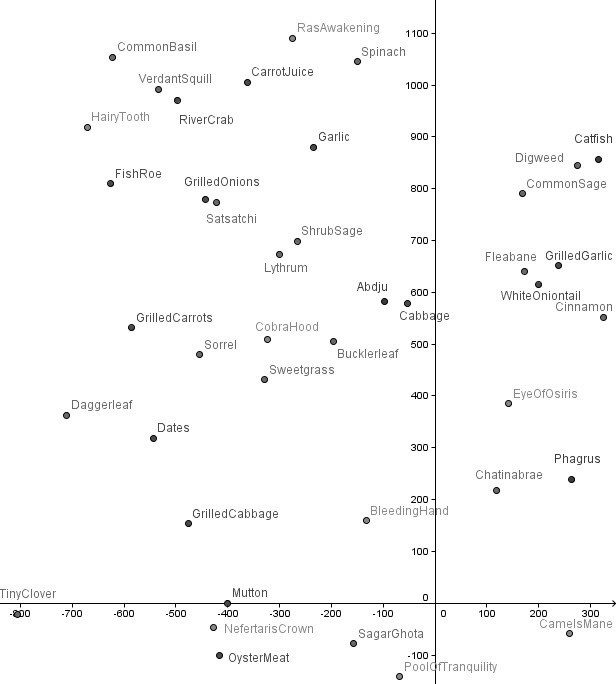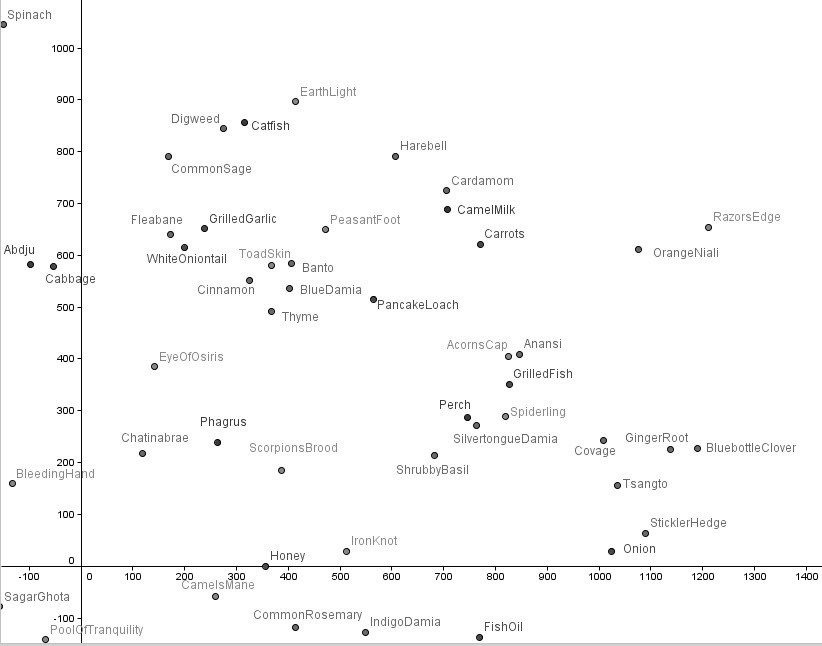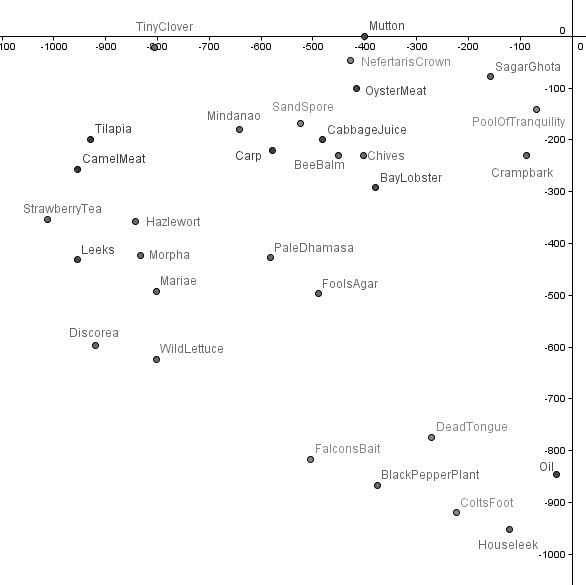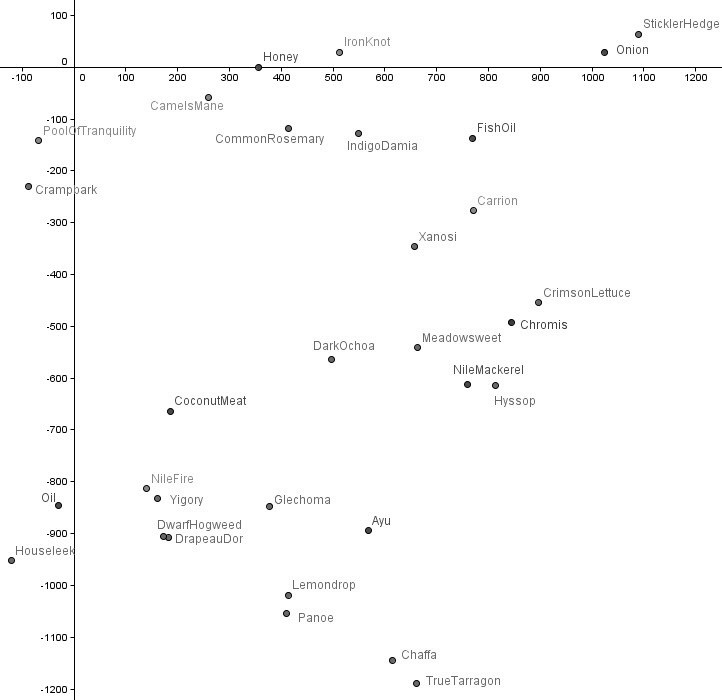The Wiki for Tale 5 is in read-only mode and is available for archival and reference purposes only. Please visit the current Tale 11 Wiki in the meantime.
If you have any issues with this Wiki, please post in #wiki-editing on Discord or contact Brad in-game.
Difference between revisions of "User:Tribisha/Cooking/Greyscale Maps"
(Created page with "This page has been copied from User:Arame/Cooking == Actual Coordinate Map == A big "Thank You" to emeraldlily for help running tests! Now available at http://cooking.drun...") |
|||
| (One intermediate revision by the same user not shown) | |||
| Line 13: | Line 13: | ||
===Upper left corner:=== | ===Upper left corner:=== | ||
| − | [[Image: | + | [[Image:NWCook_greytest.jpg]] |
===Upper right corner: === | ===Upper right corner: === | ||
| − | [[Image: | + | [[Image:NECook_greytest.jpg]] |
===Lower left corner: === | ===Lower left corner: === | ||
| − | [[Image: | + | [[Image:SWCook_greytest.jpg]] |
===Lower right corner: === | ===Lower right corner: === | ||
| − | [[Image: | + | [[Image:SECook_greytest.jpg]] |
== Cooking Data == | == Cooking Data == | ||
Latest revision as of 12:18, 28 September 2010
This page has been copied from User:Arame/Cooking
Actual Coordinate Map
A big "Thank You" to emeraldlily for help running tests!
Now available at http://cooking.drunkenfumble.com including source spreadsheets and graphing file.
Website has been updated to Pass 2 - I won't be updating the images here as often. 80 more herbs, salt, barley, and a couple of other fish & such.
Most main ingredients and first pass of herbs:
Upper left corner:
Upper right corner:
Lower left corner:
Lower right corner:
Cooking Data
Check the Testing Guild page for what herbs are done and what's scheduled. Fish & Shrooms can be found below.
What I need
If folks want to donate resources, I'm always happy to take them. Primarily, I'm using a lot of cabbage, mutton, honey, and carrots in my testing. While those are generally pretty easy to keep in stock, I use anywhere from 6 to 20 of each for testing one new coordinate, so they do move quick. Otherwise, if you see fish or mushrooms that aren't on the coordinate list or the list below, I need anywhere from 4-10db to successfully test a new item. My camp is at about (525, -1400) in Sterope.
Basics Tested
- Cabbage
- Carrots
- Garlic
- Leeks
- Onions
- Grilled Cabbage
- Grilled Carrots
- Grilled Garlic
- Grilled Onions
- Cabbage Juice
- Carrot Juice
- Camel Meat
- Camel Milk
- Mutton
- Oyster Meat
- Grilled Fish
- Oil
- Fish Oil
- Fish Roe
- Honey
- Dates
- Barleys
- Malts
- Salt
- Chicken Meat
- Eggs
Fish Tested
- Ayu
- Bay Lobster
- Nile Mackerel
- Pancake Loach
- River Crab
- White Oniontail
- Carp
- Catfish
- Abdju
- Chromis
- Perch
- Phagrus
- Tilapia
- Tigerfish
- Tilefish
- Spiny Dogfish
- Octec Longfish
Mushrooms Tested
- Acorns Cap
- Beehive
- Bleeding Hand
- Camels Mane
- Carrion
- Cobra Hood
- Colts Foot
- Dead Tongue
- Dueling Serpent
- Earth Light
- Eye of Osiris
- Falcons Bait
- Hairy Tooth
- Iron Knot
- Nefertaris Crown
- Nile Fire
- Peasant Foot
- Pool of Tranquility
- Ras Awakening
- Razors Edge
- Sand Spore
- Scorpions Brood
- Spiderling
- Toad Skin
How To Run Tests
There's a decent amount of math involved in cooking tests, but once you have the formula, it's relatively simplistic. For the basic testing, we need to find the relationship between our test subject and three or four known ingredients. For me, I use Honey, Mutton, and Cabbage to start with, and then replace failed reactions (negative times) with other ingredients. You'll run every test at a 6:1 ratio for these three ingredients, and then you'll pick the closest one (longest duration), and also test that at 13:1. Record everything in your own single-pair worksheet - you'll want it later on in your cooking career.
For testing, we then plug the data into a spreadsheet with the following formulas:

The columns are:
- Base : pretty explanatory, the base you're using in your 6:1 or 13:1 relationship.
- Additive : the ingredient we're testing.
- 7Dur : the duration of the 6:1 test. When you enter this, enter min*60 + sec, so that it's extremely easy to check.
- 14Dur : the duration of the 13:1 test. Same format as 7Dur.
- Potency = Dur Difference *14 : =(7Dur-14Dur)*14 [on my spreadsheet : (C2-D2)*14 ]
- Bulk = Duration7 - 1/7(Potency) : =7Dur - (Potency/7) [ C2 - (E2/7) ]
- Distance = 1000 - Bulk: =1000-Bulk [1000 - F2]



